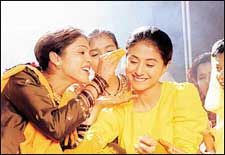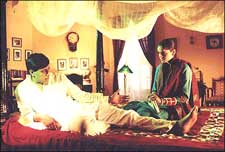Pinjar Review
Rohit Murari / fullhyd.com
Performances
Script
Music/Soundtrack
Visuals
NA
NA
NA
NA
Suggestions
Can watch again
NA
Good for kids
NA
Good for dates
NA
Wait for OTT
NA
Pinjar revisits one of the most heartrending chapters of India's modern history - that of the Partition - albeit in a manner that does not unnecessarily meander on the blood and gore of the catastrophe.

Yes, it was a painful period in the lives of many Indians who can still recall those dreadful incidents with horrific clarity. Its memory will not go away anytime soon, at least not in the next few generations. How could humanity have turned so barbaric? Millions killed, millions raped, millions looted. Why? No one really knows. No one even tries to. It is indeed distressing to note that of the umpteen films made and books written on the tragedy, not one has attempted to answer this question.
Maybe there is no answer, maybe it is so disturbing that it better be left unanswered. But, would treating the subject with respect be asking for too much? Fortunately, Amrita Pritam does not think so.

Pinjar is based on her novel by the same name. It is a story through the eyes of one woman, Puro (Urmila Matondkar) from the years 1946 through 1948. It is the story of Puro's dreams biting dust and her hopes turning into despair. It is the story of her getting sucked into the vortex of circumstances that fate thrust upon her.
Puro was your average Punjabi village girl whose only aspiration was to find her Prince Charming and live happily ever after. She does find him in Ramchand (Sanjay Suri). Tirlok (Priyanshu Chatterjee), her brother, and Ramchand's sister Laajo (Sandali Sinha) are also to be wed. All is well till Rasheed (Manoj Bajpai) kidnaps Puro a few days before the wedding.

Puro's family refuses to accept her. She goes back to Rasheed who marries her. Tirlok and Laajo, and Rajjo (Isha Koppikar), Puro's sister, and Kirpal (Ramchand's first cousin) are married. Puro's family considers her dead. They are afraid of losing their honor in the community if they accept her. But, Ramchand and Tirlok make all attempts to find her.
Then partition hits the country. Laajo is taken away to Pakistan where she is treated as a keep and an unpaid housemaid. Puro and Rasheed find her and return her to Tirlok. Ramchand is still ready to marry Puro, but she refuses. She has found love in Rasheed and stays behind at Lahore.

In a way, partition only forms the backdrop of the film. However, the issue has been treated with sensitivity. The film has not blamed any country or any community for what happened. It does not use patriotic innuendos. It tells you what happened without connoting any meaning to it. It set out to tell you Puro's story, a story that many women at the time could identify with, and it does just that - without deviating from the plot.
Urmila Matondkar is probably not going to get another role like this again. It appears that she thinks so, too, for she has given it her all. You do not see Urmila in her. You see Puro - a woman who has lost all and compromised with her fate. Manoj Bajpai may not have a big role but the man is simply brilliant. All other actors have done more than what was expected of them for their respective characters.
One film that you must watch, if only for understanding that all films on partition need not be filled with histrionics like in Gadar.
PINJAR SNAPSHOT
PINJAR USER REVIEWS
14 USERS
Performances
Script
Music/Soundtrack
Visuals
NA
NA
NA
NA
Can watch again - NA
Good for kids - NA
Good for dates - NA
Wait for OTT - NA
Be the first to comment on Pinjar! Just use the simple form below.
LEAVE A COMMENT
fullhyd.com has 700,000+ monthly visits. Tell Hyderabad what you feel about Pinjar!
MORE MOVIES
SEARCH MOVIES
Dissatisfied with the results? Report a problem or error, or add a listing.
ADVERTISEMENT
SHOUTBOX!
{{ todo.summary }}... expand »
{{ todo.text }}
« collapse
First | Prev |
1 2 3
{{current_page-1}} {{current_page}} {{current_page+1}}
{{last_page-2}} {{last_page-1}} {{last_page}}
| Next | Last
{{todos[0].name}}
{{todos[0].text}}
ADVERTISEMENT
This page was tagged for
In movie pinjar character real name
story of movie pinjar in hindi
????? ???? ??????
Pinjar
pinjar hindi movie story